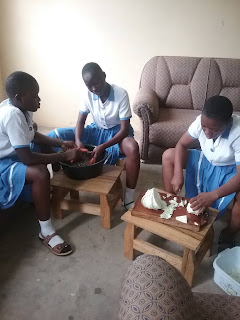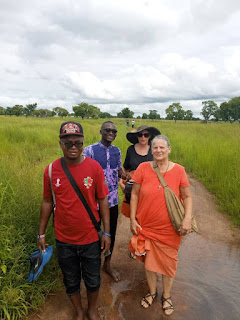I am back to share some of my
adventures from the past two months.
As the academic years started
winding down, we had one week full of cooking practicals. The cooking was
done in traditional kitchen setting for a couple reasons: first and
foremost, that is the method they will use for their cooking finals for the
WASSCE exams at the end of their third year, and secondly, we have no
electricity or running water in the practical room. I know nothing about
cooking with charcoal on a coal pot! I didn’t know how to cook the
traditional dishes - I hadn’t even
tasted most of them! How could I run these practicals? Therefore, I
had to enlist a couple other teachers to help us out. Indeed, the girls
all knew much more than I did. They were teaching me instead of me
teaching them! In the end, everyone enjoyed the experience and we all
learned something. Many of the meals I enjoyed, though there are a few
items that will take some getting used to.
One day we were shopping at the
big outdoor market and I decided I wanted some material to have a Ghanaian
dress made for me. As it turned out, I was having so much trouble
deciding which material to buy, I ended up buying four different pieces of
material. I now have plenty of Ghanaian dresses to supplement my
wardrobe.
A week later, was the end of the
academic year. All of the girls left for home for 7 weeks until the new
academic year starts on September 13th. Sadly, it also marked the end of
Mary’s two-year Peace Corps volunteer mission. Mary was our next-door
neighbor and my mentor when it came to teaching at SAGISS and getting along in
Damongo. She shared what she had learned the prior 18 months, keys
about the Ghanaian education system, how they taught at the school, where to
buy necessities in Damongo and Tamale, how to take public transportation,
etc. She was an invaluable source of information and comfort to
me. Mary is from New Mexico and is a retired college professor with a Ph.
D. in Biology. I will miss her.
One of my co-teachers, Adam, is a
Muslim and he was married in early August. Karen, Sister Juliana and I
traveled to Tamale via public transportation to attend the wedding
festivities. It was my first Muslim wedding. We arrived at the home
of his parents where all the men were sitting outside under tents. No
women in sight, other than those of us from the school. We sat out with
the men for a while and visited and took some pictures, eventually meeting his
Mother and sister. He then took us on a walk down the street for maybe
6-7 blocks where we came to the house of the bride’s parents. Here, we
saw many women outside, whom we greeted. We were then led to a small room
where the bride was sitting, where we met her and were able to have pictures
taken with the couple. We then returned to the groom’s place and were
brought into the courtyard, where all the women on the groom’s side were
sitting. We greeted them, then were taken in a room where we ate and
presented our gifts to the groom. The bride’s family will bring her to
the groom’ s family in the early evening, even though the ceremony took place
in the mosque with a few family members earlier that morning.
The past two weeks have been spent
in Tamale at a place referred to as TICCS – Tamale Institute of
Cross-Cultural Studies. It is run by the Divine Word Missionaries (SVD)
and has programs to help missionaries and foreign seminarians and others coming
to Ghana to live for a period of time, to understand the culture and Ghanaian
traditions so that we can adjust and become integrated into their
society. It has been an eye-opening experience. We have learned some do’s
and don’ts. Karen and I, both being left-handed naturally, find a few
things very difficult as use of the left hand in Ghana is looked down
upon. We are trying to be sensitive to their beliefs, but often have to
remind each other – “use the other hand!!!!”.
The setting at TICCS is very
beautiful and peaceful, with a variety of plants, flowers and trees. Our
class includes six seminarians two each from Kenya, Togo and Dem. Rep. of
Congo, Karen and myself.
We visited a couple
industries: a water purification and bottling plant (water sachets) and a
shea butter producing plant. We have shea trees on campus at SAGISS and
the girls love to eat them. However, the pit is used to make the shea
butter. It is a very interesting and time intensive process.
The plant we toured allows women who have gathered shea nuts to bring them in
and pay for the supplies they use to process the butter and assist in
selling it to provide income for their families.
Additional sensitive areas which
we in the West eschew, are the Ghanaian beliefs in use of Diviners (African
Traditional Religion) and the use of witch-craft. One afternoon, we
visited a Diviner. It is a practice/calling, passed down from one family
member to another. One must be chosen to be a diviner. Not just anyone
can choose to do it. The diviner we visited is a teacher in his
profession, but is a diviner as well. He explained the process of how he
was chosen to be the diviner; he showed us the special artifacts used in the
divination process (which are also handed down through the family), and
generally what they might mean. We were given a chance to speak with him
individually, but most of us, including myself, chose not to.
The belief in Witch-craft in
Ghana, especially in the northern villages, can be very damaging to the women
who are accused of practicing it. In these villages, everything that
might be negative in a person’s life, must have a cause. If someone falls
sick, they blame it on the witch-craft of another. If someone dies,
someone else must have used witch-craft to cause it. We in the West look to
science to explain certain illnesses or deaths. Or maybe, the bad thing
is an “Act of God”. Unfortunately, in these villages, there is typically
an older woman who is accused of witch-craft. Once one is accused, they
run from the village in fear of having their life taken. They are often
threatened by beatings if they deny the accusations.
Ghana, I believe, is the only
country that has some “witch camps”. These are areas set aside for these
women who are banished from their communities to live in some type of peace and
safety. We drove 3 hours to a town which allows these women to live
there. They come from a number of villages in the area. Once we
parked our car, we walked through some maize (corn) fields, through many
muddy puddles down a small path to where this “witch camp” existed. (I
apologize for the picture where it looks like I was overly concerned that my dress
not get wet! Not too modest! When I saw that picture I roared with
laughter! Hilarious!)
Father Fanuel, who heads TICCS,
was once the pastor of the Catholic Church Parish in the town and he worked
hard at providing some better living condition for the women: a bore-hole
for water, latrines, solar lighting, more huts for housing. They still
struggle for their daily food, but it was amazing how well they lived together
in community.
We were shown around their
community and met and talked with a group of women through an interpreter as
most did not speak English. I asked what they did for entertainment/fun/
to find joy and they responded that they pray and sing together. A couple of
the women proudly showed us the rosaries they had hanging from their
necks. Before we left, I asked if they would be willing to sing for us,
which they did. Singing and dancing go together, so we joined in the
dancing with them. It was a very emotional visit, one I won’t
forget. As I reflected on the situation these women were living through,
it hit me that they have had to give up their lives as they knew it. They
had accepted their plight, even though being wrongly accused. They were
praying to find joy. They are living their purgatory here on earth.
The information I have garnered
from both the classes and the experiences provided by TICCS is very
enlightening and has helped me understand some of the traditional practices
that we in the West find very unusual. I hope that now when I go back to Damongo
and SAGISS, I will have a new perspective that will help me in forming my
relationships with the people I encounter.
The adventure continues…….





















